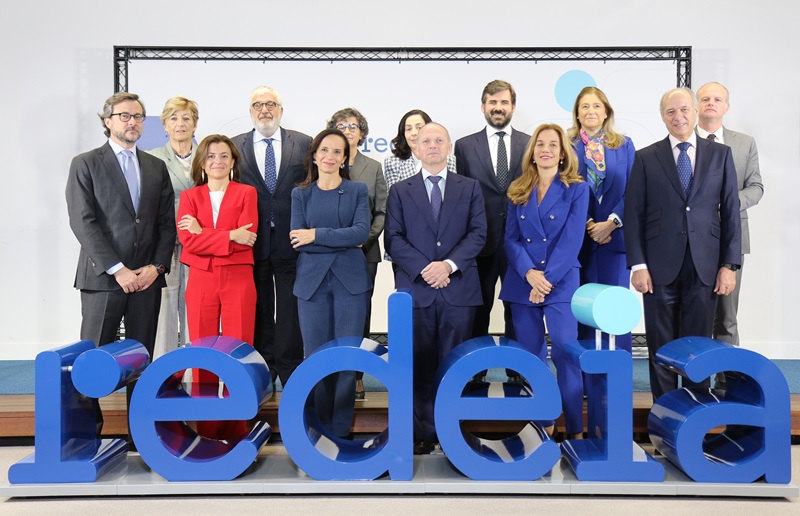We are a global operator of essential infrastructure
- Compromiso Rural is born: A collaborative platform involving both the private and public sectors to promote, expand, and replicate projects with a positive impact on rural Spain
- Institut Cerdà promotes Compromiso Rural with the support of the Ministry for the Ecological Transition and the Demographic Challenge. Also involved are Redeia and its subsidiary Hispasat, Agbar, Banco Sabadell, SAREB, and the Universitat Oberta de Catalunya
- In the first phase, seven projects related to key challenges in rural Spain have been identified, which concern connectivity and digitalisation, promoting economic activities, improving public social services, attracting and retaining populations, and the energy transition
Institut Cerdà presented the Compromiso Rural project today in Madrid at the Banco Sabadell auditorium. This project is designed to promote collaboration between companies and the government for rural development.
The initiative aspires to create a permanent public-private collaborative platform that fosters a comprehensive approach to rural development projects. It involves the participation of various private companies representing the main socioeconomic sectors, with the support of the Ministry for the Ecological Transition and the Demographic Challenge (MITERD). So far, Compromiso Rural counts with the participation of Redeia and its subsidiary Hispasat, Agbar, Banco Sabadell, SAREB, and the Universitat Oberta de Catalunya (UOC).
In the past year, the first phase of the project has been completed by analysing active initiatives in rural areas, both public and private. Common interests among the involved companies have been identified to propose leading projects in rural areas that are productive, sustainable, rooted in the community, collaborative, scalable, and replicable to improve their efficiency and effectiveness.
In this first phase, seven leading projects in promotion or implementation have been identified, and they have been presented in Madrid during a working session opened by the Secretary-General for the Demographic Challenge, Francisco Boya.
Companies involved in Compromiso Rural presented their projects in two roundtable discussions focusing on creating synergies in rural areas (Agbar, Hispasat, and SAREB) and promoting networks (Banco Sabadell, Redeia, and UOC, along with the Secretary-General for the Demographic Challenge).
Added value for rural areas
Rural areas make up 84% of the Spanish territory, and rural municipalities account for 82% of all Spanish municipalities. However, just 16% of the population lives in rural areas.
This territorial inequality is most pronounced in the regions of Castilla-La Mancha, Castilla y León, Navarre, and Extremadura, followed by Cantabria, La Rioja, and Aragon. In these regions, rural areas play a strategically important and relatively more prominent role compared to the rest of the regions.
According to data from MITECO, three out of every four municipalities in Spain have lost population over the last decade, making depopulation a structural problem in the territory, primarily affecting small municipalities. In addition to depopulation, there are issues stemming from territorial dispersion and low population density, which often hinder the provision of essential services and the development of economic activity.
To address this issue, the Ministry has established several public programmes and financing funds to support projects in rural areas, with a focus on new opportunities, particularly through ecological and digital transition. The private sector has also initiated projects in recent years to improve services and infrastructure in these areas and promote socioeconomic development.
Building on the analysis of these projects, Compromiso Rural proposes to "increase their added value and effectiveness, promoting collaborative work and avoiding the risk of isolated proposals with limited scope," as stated by Carlos Cabrera, CEO of Institut Cerdà, during the presentation.
In the same way, Francisco Boya, Secretary-General for the Demographic Challenge at the Ministry for the Ecological Transition and the Demographic Challenge, highlighted that: "That's why we consider it highly positive to be able to identify alliance opportunities to promote leading projects or services for economic development in rural areas, which is the goal of this Commitment."
First phase: 7 leading projects identified
During the first phase, a total of 72 active initiatives in rural areas have been analysed. 29 of them involve companies already engaged in Compromiso Rural.
The analysis shows that:
- Castilla y León, Aragon, Andalusia, Galicia, Castilla-La Mancha, and Extremadura, in that order, are the regions with the most active initiatives.
- The identified initiatives are carried out in 470 locations, which are generally not regional capitals. More than 45 initiatives are implemented in multiple locations.
- Most initiatives focus on four sectors—environment, education, digitalisation, and livestock— aiming to address population loss, low employment rates, and slow economic growth.
- Two out of three initiatives result from public-private collaborations. Major companies drive initiatives in the private sector, while local public administrations and local social entities act as public allies.
Based on this analysis and with the support of the Ministry for the Ecological Transition and the Demographic Challenge, the first phase has been focused on defining common interests among the project companies and identifying existing synergies and collaboration opportunities. Thus, seven leading rural development projects have been identified, which will be launched in the last quarter of the year. These are focused on key elements such as connectivity and digitalisation, promoting economic activities, improving public social services, attracting and retaining population, and the energy transition. Two of these projects involve improvements to initiatives previously driven by some of the participating companies, while the remaining five are new initiatives.
1. Rural entrepreneurship
Collaboration: Redeia, SAREB, Banco Sabadell, and UOC.
Objective: To enhance rural entrepreneurship by supporting existing initiatives in this area.
2. Rural innovation
Collaboration: Redeia, Banco Sabadell, and UOC.
Objective: To enhance innovation in rural areas by leveraging existing projects and acceleration structures within organisations.
3. Digital training for municipal management
Collaboration: Universitat Oberta de Catalunya (UOC), Agbar, and Redeia.
Objective: To update the skills of small municipalities in managing essential services like water, electricity, or connectivity in the context of digital and energy transformation. The goal is to bridge the gap with more urban population centres by offering training programmes in basic services with appropriate accreditation for decision-makers in small municipalities.
4. Development of energy infrastructure
Promoter: SAREB.
Objective: To promote the development of energy infrastructure in locations where SAREB owns land in rural areas.
5. Housing for seasonal workers
Promoter: SAREB.
Objective: To promote the development of housing for seasonal workers in rural areas where SAREB owns land or housing.
6. Connectivity and digitalisation of the water cycle
Collaboration: Hispasat and Agbar.
Objective: To promote the connectivity and digitalisation of facilities and territories where Agbar provides services in rural areas. This is especially important as water plays a central role due to the advancement of climate change.
7. One-stop shop: rural mobile office
Collaboration: Territorial Innovation Centres of the Ministry for the Ecological Transition and the Demographic Challenge, UOC, Banco Sabadell, Hispasat, and Agbar.
Objective: To promote a mobile one-stop shop that operates in different rural municipalities, streamlining procedures related to basic services, as well as providing information and training to residents.












